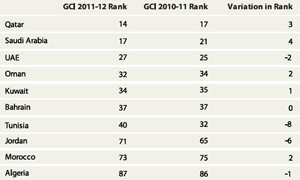WEF: Qatar Being Most Competitive in the MENA Region
Qatar has been ranked the most competitive economy in the MENA region, according to the WEF.

Qatar has been ranked the most competitive economy in the MENA region, according to the World Economic Forum’s (WEF) Global Competitiveness Index (GCI) this year. With a score of 5.24, it has jumped 3 notches up from last year’s rank to reach the 14th spot among 142 countries.
Qatar’s strong competitiveness rests on the solid foundation of high-quality institutional framework, stable macro- economic environment and efficient goods market.
Over the past year, the MENA region has been affected by a great deal of turbulence that would have an impact on national competitiveness and might further exacerbate the competitiveness gap between the Gulf economies and the rest of the region, as per the report. This trend is reflected in this year’s GCI results, where most Gulf countries continue to move up in the rankings, while the competitiveness of many countries from North Africa and the Levant stagnates or deteriorates. Although some impact of the Arab Spring may have been factored into this year’s rankings of the region’s economies, the full impact would only be felt in next year’s index.
Qatar’s strong competitiveness rests on the solid foundation of high-quality institutional framework, stable macro- economic environment and efficient goods market. The country’s high rate of growth combined with prudent government support to the financial sector helped to maintain a strong macroeconomic and financial stability, according to the WEF.
The UAE continued to outperform many major economies in a number of parameters. The country’s overall competitiveness reflects the high quality of its infrastructure, where it ranks 8th globally, as well as its highly efficient goods markets (10th). Strong macroeconomic stability (11th) and some positive aspects of the country’s institutions, such as an improving public trust in politicians (8th) and high government efficiency (5th), round up the list of competitive advantages.
Egypt ranked 94th, dropping by 13 places globally. Besides, Tunisia ranked 40th globally, down by 8 ranks compared with last year. Apart from the security situation, there is an increased uncertainty regarding the future direction of economic policy as well as higher public awareness of Tunisia’s structural weaknesses resulting mainly in poorer assessments of different aspects of public and private institutions whose ranking dropped from the 23rd place to the 41st this year. However, Tunisia continues to display solid educational outcomes and a healthy macro-economic environment.
Sources: World Economic Forum, Bank Audi’s Group Research Department
The article above has been published as a part of Bank Audi`s MENA Weekly Monitor of Week 37 (2011). It can be accessed via Internet at the following web address : http://www.banqueaudi.com